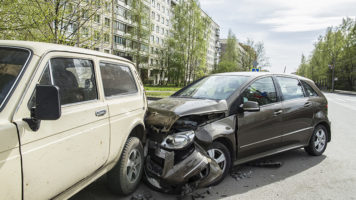There are many reasons why large semi-trucks crash, but no matter what causes a truck accident, these events often result in devastating injuries and damage. For injured truck accident victims to recover compensation for their losses, they must identify the cause of the truck crash and who should be liable. They can best accomplish this with help from a skilled truck accident lawyer.
Driver Error
For the most part, big truck drivers are skilled and patient drivers. Although the size and weight of semi-trucks are related to the dangers, additional components contribute to big truck collisions.
Speeding
Speeding is the second-leading cause of semi-truck accidents, involving nearly 23 percent of commercial truck crashes. The National Highway Traffic Safety Administration reported that nearly 18 percent of all large-truck drivers involved in a fatal crash had at least one prior speeding conviction. Typically, commercial trucks weigh about 80,000 pounds, and as their speed increases, the force is made even more deadly.
Unfamiliar Roadways
Large trucks travel thousands of miles to meet their destination, and through their travel avoiding an unfamiliar roadway is almost impossible. If a driver must take a detour, they may look into the distance or off to the side to find an alternate route. Truck drivers must prepare by planning trips accordingly.
Drunk and Drugged Driving
Drunk and drugged driving among truck drivers occurs at alarmingly high rates, despite serious criminal penalties and public safety campaigns. Alcohol and drugs can affect a person’s ability to safely operate a motor vehicle in several ways, including negatively affecting reaction times and impairing judgment. Fortunately for people who suffer injuries from impaired drivers, state law typically entitles them to compensation for all of their accident-related losses.
If a drunk driver has injured you, you should remember that any criminal prosecution of the other driver is unrelated to the civil claim you can likely pursue. While a court may ultimately convict the other driver of drunk driving, you still need to take certain steps to protect your legal rights and obtain compensation for your losses. As a result, you should always contact a truck accident lawyer after an accident caused by a drunk truck driver.
Blind Spots
The typical tractor trail is 12 to 13 feet long. Although drivers must check blind spots frequently and carefully, inadequate surveillance accounts for 14 percent of semi-truck wrecks.
Driver Fatigue
Driver fatigue is one of the top two causes of large truck collisions. In recent decades, the problem of fatigued truck drivers became obvious to federal regulators and the National Transportation Safety Board. As a result, the Federal Motor Carrier Safety Administration (FMCSA) enacted and now enforces strict hours of service restrictions for commercial drivers. These restrictions require drivers to take rest breaks after a certain number of hours on the road or consecutive days of driving.
Even though these restrictions should be clear to every driver and trucking company, many drivers fail to comply with the rest requirements. They might even get incentives from employers to push through fatigue and make more deliveries. While truck drivers might use drugs or caffeine to stay alert, most of these substances have the opposite effect and do not overcome fatigue.
Driving Too Fast for Conditions
Commercial truck drivers often run on tight schedules, incentivizing them to speed – even in adverse weather conditions. Unfortunately, they often speed even though federal regulations require commercial drivers to use extreme caution in poor weather conditions such as snow, ice, rain, or fog. Importantly, driving too fast for the conditions is not the same as speeding.
A trucker can drive at less than the posted speed limit yet still drive negligently. A truck accident attorney familiar with the Federal Motor Carrier Safety Regulations (FMSCR) can review the facts of your case and determine whether there is evidence sufficient to support the assertion that the driver was driving too fast for the conditions.
Aggressive Driving and Road Rage
Truckers are professional drivers who often spend dozens of hours behind the wheel every week. As a result, it stands to reason that they experience their share of annoyances with other drivers, construction, and the other parts of being a motorist that many of us can do without. When a trucker driving an 80,000 semi-truck engages in road rage or aggressive driving, the results can be disastrous.
Some examples of aggressive driving that can lead to serious accidents include:
- Following too closely
- Not letting other drivers pass
- Cutting other motorists off
- Honking the horn or flashing high beams
- Gesturing or yelling
- Brandishing weapons
- Speeding
Failure to Conduct a Pre-Trip Inspection or Notice Vehicle Problems
Modern commercial trucks are extremely complicated equipment with thousands of individual parts. Federal regulations require that truckers conduct a pre-trip inspection before operating their trucks, and general negligence principles require that drivers use reasonable care to determine whether their vehicles are safe. If they fail to do either and people get hurt, victims can usually recover compensation for their losses.
Some examples of mechanical failures that can lead to truck accidents include:
- Brake failures
- Windshield wiper malfunctions
- Coupling device failures
- Issues with headlights, stoplights, turn signals, or conspicuity lights
- Tire blowouts
- Steering problems
How to Protect Your Rights after a Serious Truck Accident?
If you suffered injuries in a truck crash, protect your right to recover compensation. While you may seek compensation as a matter of law, trucking company insurers will do everything to avoid paying out on claims. When they cannot avoid liability, trucking companies will minimize what they must pay victims. Some of the things you should do to protect your rights include the following.
Seek Medical Care and Follow Your Treatment Plan
You should always seek medical attention after any motor vehicle accident. The severity of your injuries may not be apparent until a few weeks or days after your crash. Seeing a medical professional will identify your injuries and start your treatment immediately.
Additionally, you need an official medical record describing your injuries and connecting them to your crash. Finally, failing to seek medical attention promptly can allow the insurance company to argue that you failed to mitigate your damages, potentially hurting your claim.
Then, follow your treatment plan. If you do not, the insurance company may argue that your injuries cannot be as serious as you are claiming they are. As a result, you should go to follow-up appointments, attend physical therapy if recommended, fill any prescriptions you receive, and follow any other recommendations your doctor gives you.
Do Not Accept a Settlement from Anyone
In the days and weeks after a truck crash, the insurance company or the at-fault party may approach you with a settlement offer. Never take any settlement offer until you have had a chance to speak with an attorney. In most cases, first settlement offers are less than cases are worth and are typically an attempt to limit liability.
In some cases, the other party may even try and talk you out of retaining a lawyer to represent you. Doing so is also an attempt to limit liability, as insurance companies know that victims often do not know the true value of their cases. While you may ultimately accept a settlement, it is best to do so after an attorney has reviewed your case and determined how much you should receive.
Call a Truck Accident Attorney as Soon You Can
Finally, contact a truck accident lawyer as soon as possible after an accident with a commercial truck. An attorney can review your case, determine whether you have a claim, and take steps to obtain and preserve any evidence you may need to win your case. Furthermore, once counsel represents you, the other side cannot contact you directly, ensuring that you do not say anything that they can use against you.



